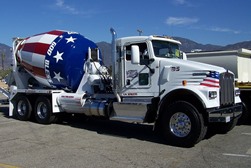How to Choose a CDL Truck Driver School
 You have finally decided to pursue your dream of becoming a tractor trailer driver and enroll in a CDL Training School. As you are probably aware, the trucking industry offers great career opportunities, with high pay, job flexibility and potential for advancement. But all truck driving schools are not equal, and it is important that you choose the right one to receive the proper training so that you can qualify for your Commercial Driver’s License (CDL). Obviously price will be an important factor, but it should not be the only factor when making your school choice. Many people also gravitate towards the closest trucking school when searching for options. But choosing the cheapest and the closest school isn’t always the best option for your training and long term career goals. After all, your number one priority isn’t to graduate, but rather to learn the skills that will make you a professional truck driver and pass your CDL exams. So let’s take a look at some of the other factors you should consider before deciding on which truck driver training to enroll in. But first you need to decide on which class of CDL you will need.
You have finally decided to pursue your dream of becoming a tractor trailer driver and enroll in a CDL Training School. As you are probably aware, the trucking industry offers great career opportunities, with high pay, job flexibility and potential for advancement. But all truck driving schools are not equal, and it is important that you choose the right one to receive the proper training so that you can qualify for your Commercial Driver’s License (CDL). Obviously price will be an important factor, but it should not be the only factor when making your school choice. Many people also gravitate towards the closest trucking school when searching for options. But choosing the cheapest and the closest school isn’t always the best option for your training and long term career goals. After all, your number one priority isn’t to graduate, but rather to learn the skills that will make you a professional truck driver and pass your CDL exams. So let’s take a look at some of the other factors you should consider before deciding on which truck driver training to enroll in. But first you need to decide on which class of CDL you will need.
Which Commercial Driver’s License Do I Need?
 In the United States, to legally drive large commercial vehicles, an operator must have a Commercial Driver’s License. There are three types of CDLs that you can apply for, which are Class A, Class B and Class C. Since the scope of this article is choosing a truck driving school, we are really only interested in discussing Class A and Class B licenses. Each CDL Class is based on the type of vehicle driven as well as its gross vehicle weight rating (GVWR) or gross combination weight rating (GCWR).
In the United States, to legally drive large commercial vehicles, an operator must have a Commercial Driver’s License. There are three types of CDLs that you can apply for, which are Class A, Class B and Class C. Since the scope of this article is choosing a truck driving school, we are really only interested in discussing Class A and Class B licenses. Each CDL Class is based on the type of vehicle driven as well as its gross vehicle weight rating (GVWR) or gross combination weight rating (GCWR).
Class A. Class A CDLs are required to operate any vehicle that has a GCWR of more than 26,000 lbs., including a towed vehicle of greater than 10,000 lbs. Some of the vehicles that you may be able to drive with a Class A license are:
- Interstate Tractor Trailers
- Intrastate Tractor Trailers
- Trucks with Double or Triple Trailers
- Tanker Trucks
- Livestock Carriers
Class B. Class B CDLs are required for single vehicles having a GVWR of more than 26,000 lbs., or a GCWR of more than 26,000 lbs. including a towed vehicle weighing up to 10,000 lbs. Some of the vehicles that you may be qualified to drive with a Class B license are:
- Heavy Trucks
- Tractor Trailers
- Dump Trucks
- Cement Mixers
- Large Buses
With both Class A and Class B CDLs, endorsements may be required to operate specific vehicles. And with the proper endorsements, a Class A license holder may operate any vehicle that a Class B license holder is qualified to operate.
What to Look For in a Trucking School
 As we have already discussed, price and location will probably be your initial concerns when considering which CDL driving school to enroll in. But these should not be your only considerations, as there are several others that are equally, and in some cases, more important to investigate before making your final decision. Following are some of the things you need to put on your due diligence checklist before enrolling and especially paying for your truck driving training.
As we have already discussed, price and location will probably be your initial concerns when considering which CDL driving school to enroll in. But these should not be your only considerations, as there are several others that are equally, and in some cases, more important to investigate before making your final decision. Following are some of the things you need to put on your due diligence checklist before enrolling and especially paying for your truck driving training.
Track Record. How long a truck driving school has been in business can be a good indication of the quality of the school. However, even good schools had to start from day one. So only use time in business as one indicator to confirm that a school is established and not a fly-by-night operation. Find out what the school’s track record is as far as graduation and employment rates. Be wary of any school that won’t share those numbers with you. Also, find out what relationships they have with major trucking companies. The more contacts that they have in the industry, the better their reputation and ability to place students in jobs. Finally, check with the State licensing agency to find out if the CDL training school is in good standing or if they have been the target of complaints.
Quality of Training. It is important to choose a school that is State licensed and employs experienced and trained instructors. The instructors should not only have had successful careers as truck drivers, but be trained to teach driving techniques. Also, the school should have a student to instructor ratio of no more than 4 to 1. Anything higher means that the necessary one-on-one instruction behind the wheel will be limited. And be wary of any school that promises to train you to be a truck driver in a week or so. Learning to drive a big rig properly can take some time, especially if you want to do it both professionally and safely. Most schools can run anywhere from 3 weeks to close to 2 months, depending on the license you are training for.
Quality of Instructors. As we have already covered, it is important that the instructors are experienced drivers and trained to teach. Some states have minimum driving time requirements in order to become an instructor. But as a rule, the more truck driving experience an instructor has the better. Instructors should also keep abreast of industry trends as well as changing or new regulations. This may be a more subjective category to evaluate, and perhaps the best way to do so is visit the school and talk with some of the instructors and students. Find out if students are satisfied with the quality of the instruction and the teacher’s ability to train them.
Driving Time. One of the most important factors when evaluating a truck driving school is how much driving time the students receive. As implied, driving time is how much time a student spends behind the wheel actually driving a truck. It does not include the use of simulators or riding along with other students. The more instructed drive time a student receives the better the driver they will become. Schools will vary, but a minimum of 32 hours is a pretty good benchmark.
Captive or Independent. Some trucking schools will offer discounted or even free training if you commit to driving for a certain carrier for a specific period of time. This is referred to as Contract Training, and such schools are known as Captives. Unlike other schools, which may have relationships with multiple trucking lines that you can drive for, these schools only represent and refer to one company. So although the schooling is more affordable or free, there is a trade-off as far as where you can initially work, which may affect your income opportunities. Be sure to know what type of school you are dealing with upfront so that you can make an informed decision before enrolling.
3rd Party Tester. Some states allow truck driver training facilities to provide CDL testing on site. If allowed in your State, find out if the school you are considering is DMV certified to conduct CDL testing for its graduates. In addition to being more convenient, it is an indication that the state deems the school to be of a higher quality. Also, onsite testing can help to avoid delays by competing with other school’s graduates for testing times at the state testing facilities.
Course and Class Flexibility. Truck driver training is relatively short in duration, generally from one to two months, so it is important that the school you choose is flexible enough to accommodate your needs. If you are having difficulty with a particular maneuver, such as making a wide turn, then the instructor should be willing to spend more time with you until you master it. Also, the class scheduling needs to be flexible enough to accommodate those students who are still working or have other obligations.
Job Placement. Once you have graduated from truck driving school and obtained your commercial license, you are going to be anxious to start your new career. Make sure that the school you choose has a job placement assistance program. Find out which trucking companies routinely hire from the school, what the job placement rate is as well as the average starting salary. Be wary of any school that has very few employers recruiting their graduates.
Learn More About CDL Training Schools
Choose the Right CDL Training
Enrolling in the right CDL school is an important first step in beginning your new career as a either a short-haul or a long-haul trucker. The most important thing is that you receive the proper training so that you are able to operate a large commercial vehicle in a skillful and safe manner. You can choose a captive school and train on a contracted basis for a specific carrier in exchange for a reduced or even free tuition. Or you can have the freedom of driving for the trucking company of your choice by enrolling with an independent school. The choice is yours. But no matter how you start your new career in transportation, be proud to be part of an industry that touches almost every facet of our lives.
